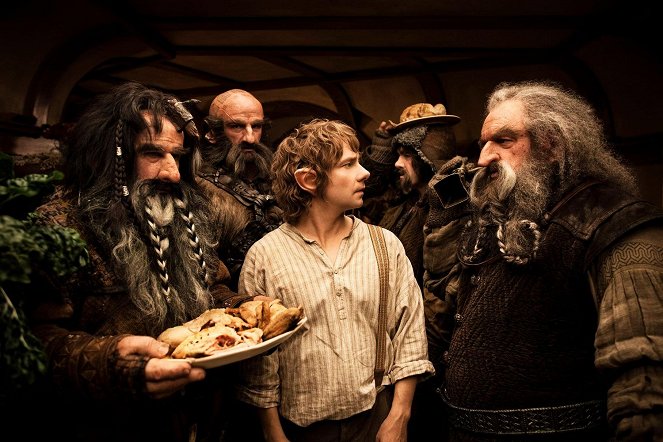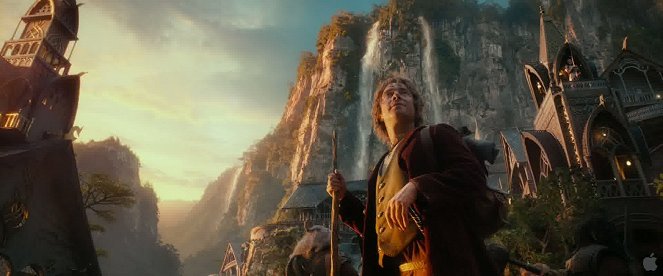Reżyseria:
Peter JacksonZdjęcia:
Andrew LesnieMuzyka:
Howard ShoreObsada:
Martin Freeman, Ian McKellen, Richard Armitage, Ken Stott, Graham McTavish, William Kircher, James Nesbitt, Stephen Hunter, Dean O'Gorman, Aidan Turner (więcej)VOD (3)
Opisy(1)
Pierwszy z filmowej trylogii - opartej na ponadczasowym arcydziele Hobbit, czyli tam i z powrotem autorstwa J.R.R. Tolkiena - Hobbit: Niezwykła podróż podąża śladami Bilbo Bagginsa, który wyrusza na epicką wyprawę by odzyskać legendarne królestwo Krasnoludów i pokonać smoka Smauga. W drodze Hobbit nie tylko odkryje w sobie odwagę i pomysłowość, ale zdobędzie też pierścień, który wpłynie na losy całego Śródziemia. (Galapagos)
(więcej)Materiały wideo (74)
Recenzje (18)
I expected those weird people who in their free time dress as dwarves, elves and goblins and play at fighting in fields and forests to be excited about The Hobbit regardless of its quality, so I took the 86% rating with a pinch of salt and went to the cinema convinced that I wouldn’t give it more than two stars, and that I would regret it. This opinion was the result of the strange intention of the studio to stretch a slim book as much as possible, the bland trailers and, in particular, my negative experience with post-LotR Jackson (value for money, I think King Kong and Lovely Bones are the worst monstrosities Hollywood has produced in recent years). But that didn’t happen and here you have four stars (70%), and even though I’m not trembling in delight, it’s still a pleasant surprise. The Hobbit is nice eye candy with beautiful locations, a likeable protagonist and good special effects (by the most part). No more, no less. It’s hurt, though, by the weird attempt to blend the fairytale spirit of the book with the more adult character of Lord of the Rings. It rides on a similar nostalgic vibe as last year’s Expendables II, though this time it actually worked on me, because, unlike silly action flicks from the 80s, I do like Middle Earth. I will probably be one of the few who enjoyed more the first “boring” half, where the characters only talk and you can quietly soak in the atmosphere of The Shire (from the LotR trilogy, my favourite part is the beginning of The Fellowship of the Ring). The second half, good action notwithstanding, is an example of why I generally don’t like fantasy as a genre, and why sometimes I call it a parody of sci-fi. When the heroes get in trouble, the flexible rules of the fantasy world always allow from some bullshit deus-ex-machina to save them, and in the case of the ending The Hobbit, this is literal. 70%. PS: If I ever watch it again, I will have fun trying to count how many times one of the characters screams “Run”! And I will try to remember each dwarf other than by the colour of their hair and beards.
()
Returning to Middle-earth after so many years is fine. The three hours are still mesmerizing in the perfect WETA world, both in the moments of infantile goofiness (the book itself is a fairy tale) and the ultimate in self-indulgence (the battle of the thundering men of the rocks), yet it all feels somehow... hollow. This is mainly because there is no imaginative moment from a distinctive filmmaker and the only vital moment of the whole film is the puzzle game with Gollum. In the end, I'm actually sorry in retrospect that Guillermo del Toro didn't direct it because Peter Jackson loves this world maybe a little too much. I liked it, and yet I have no reason to ever see it again.
()
With “The Hobbit” is like with the weather. When it’s hot, people complain it’s hot, and when it’s cold, they complain that it’s cold. With “The Lord of the Rings”, audiences grumbled that Jackson left out a lot and adapted it to his own image; with “The Hobbit”, they grumble the opposite, that the adaptation is too literal and consistent in quoting Tolkien's book. People just don't know what they want, you can't please anyone and I laugh at this herd mentality. So....did you find Jackson's King Kong overwrought, but you loved it anyway because you admired its perfect filmmaking craft and imagination? Or on the other hand, is there at least a tiny soul of a child left in you who likes to play and wonder? In that case, you’ll sure love The Hobbit. It's like coming to a long-awaited party among old friends and feeling at ease with them. On top of that, Jackson will overwhelm you with so many audiovisual sensations that you will feel like you’re drinking moonshine. Leave the boredom and negativity to the curmudgeons and to Spáčilová with her worn-out compilation of foreign reviews. And for the rest of you, put on your hats and run to the cinema! Jackson is still on top and the spirit of Middle Earth is still alive.
()
Whereas LOTR was filmed out of love and with little money, The Hobbit was filmed for money. The first viewing made me happy because of the return to Middle-earth, enveloped in Howard Shore’s music. But after the second viewing, I dropped my rating to three stars. It is unforgivable that the scenes with Gollum, who was a highlight of the phenomenal trilogy a decade ago, are so protracted that they cannot keep my attention with every word. In fact, the entire first Hobbit is incredibly protracted. While in LOTR you felt that it could’ve been longer, which it was with the extended editions, the first Hobbit looks as if it’s stuffed with cotton wool. If it portrayed some more intense relationships between the characters, such as Frodo’s friendship with Sam, it would’ve been more engaging. But there aren’t any such relationships. And the key problem compared to LOTR is the most expected: Peter Jackson cannot rely here on the ultimate evil and the menacing darkness, whose portrayal has always been his most powerful directorial asset. He does not have Sauron, Saruman, Mordor or the Uruk-hai, whom the main heroes have no chance against. LOTR’s strongest motif was the courage of the small, peaceful hobbits to confront the invincible, colossally powerful enemy. The Hobbit doesn’t have that. The main bad guy with his bunch of orcs is the most exciting feature of the film, but he’s not playing a bigger role in the story than, say, any of the bad guys from Narnia, The Golden Compass or similar superficial digital affairs. Martin Freeman is excellent, however, and the most beautiful scene of the film for me is the flight of the eagle.
()
“The World isn’t in your books and maps. It’s out there.” Review of the extended version (I haven’t seen the cinematic release). Though it is presented as an adventure fantasy following in the footsteps of The Lord of the Rings, for me The Hobbit was primarily a story about the transformation of a wayfarer (or nerd) journeying through fictional worlds, who longs mainly for his books, into a real hero. In particular, Bilbo’s lack of capability for epic adventure enlivens and advances the narrative (culinary tips given to giants, escaping from the Goblins). A forgotten handkerchief brings about not only the gradual loss of all creature comforts, but also the protagonist’s transformation from someone who constantly seeks a stronger leader to guide him into a character who acts of his own volition. I believe that this transition toward independence will continue in future instalments. The long introduction in Hobbiton is not important solely for the purpose of outlining the objective of the mission and introducing the dwarves. The depiction of the comfort in which the provincial-minded “no adventure” halfling lives also serves as a contrasting background for the situations in which the protagonist later finds himself. Nostalgia for one’s lost home is a motif that is given greater depth throughout the film, not only through Bilbo, but also through the dwarves living in exile after their exodus. The Hobbit and the dwarves repeatedly overcome their physiognomic preordination, as they have to face enemies much larger than themselves again and again. The gradual intensification of the risks with which the characters are confronted occurs in parallel with a warning of future threats, resulting in The Hobbit becoming a major promise of events that have yet to come. There is no harm in postponing the undiluted spectacle, because the adventure presented to us grows in parallel with Bilbo, who is just getting his bearings in a world of real danger, so he has enough time for riddles with a schizophrenic scoundrel and, like the viewer, must have a lot explained to him. The explanatory passages turn the main storyline into a font of secondary storylines that, however, do not slow down or distract from the primary narrative, as they converge at the initial source and make it clear that their importance will be fully appreciated in the sequel. Only the length of some of the action sequences goes beyond the needs of the narrative, revealing that Jackson, like del Toro, is at heart a gadgeteer with a weakness for bizarre monsters. Furthermore, the raw visual aspect of the action scenes does not fit well with the more lyrical image of the picturesque landscape. Given the multiple screenwriters and the literary and other sources that they drew from, the result is still admirably cohesive and it’s been a long time since I enjoyed such a pure (in genre terms) and (in the good sense of the word) old-fashioned adventure. 85%
()
Galeria (243)
Photo © New Line Cinema, Metro-Goldwyn-Mayer, Warner Bros. Pictures / James Fisher, Mark Pokorny



Reklama